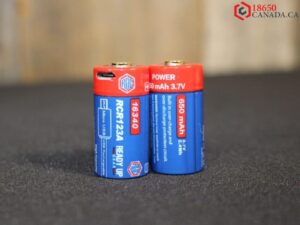Rechargeable batteries are batteries that can be recharged and reused multiple times. They are useful for powering various devices, such as smartphones, laptops, cameras, and electric vehicles. Rechargeable batteries can save money and reduce environmental impact compared to disposable batteries. There are different types of rechargeable batteries available, each with its own advantages and disadvantages.
One of the most popular and advanced types of rechargeable batteries is lithium-ion batteries. Lithium-ion batteries use lithium ions as the main component and have many benefits over other types of rechargeable batteries.In this article, we will compare lithium-ion batteries to other types of rechargeable batteries, such as nickel-cadmium (NiCd), nickel-metal hydride (NiMH), and lead-acid batteries.
• Comparison 1:
Energy density and capacity. Energy density is the amount of energy a battery can store per unit volume or weight. Capacity is the amount of charge a battery can store and deliver. Lithium-ion batteries have a high energy density and capacity compared to other types of rechargeable batteries.
This means they can store more energy and deliver more power in a smaller and lighter package. For example, a typical lithium-ion battery has an energy density of 100-265 Wh/kg and a capacity of 1500-3000 mAh, while a typical NiCd battery has an energy density of 40-60 Wh/kg and a capacity of 600-1000 mAh.

• Comparison 2:
Shelf life and self-discharge rate. Shelf life is the time a battery can retain its charge when stored. The self-discharge rate is the rate at which a battery loses its charge when not in use. Lithium-ion batteries have a long shelf life and a low self-discharge rate compared to other types of rechargeable batteries.
This means they can retain their charge for longer periods and require less frequent charging. For example, a typical lithium-ion battery has a shelf life of 2-3 years and a self-discharge rate of 5-10% per month, while a typical NiMH battery has a shelf life of 6-12 months and a self-discharge rate of 20-30% per month.
• Comparison 3:
Cycle life and memory effect. Cycle life is the number of times a battery can be charged and discharged before its capacity drops significantly. Memory effect is the phenomenon where a battery loses its maximum capacity when repeatedly charged and discharged to the same level. Lithium-ion batteries have a long cycle life and no memory effect compared to other types of rechargeable batteries.
This means they can be charged and discharged at any level without affecting their performance and last for more cycles before needing replacement. For example, a typical lithium-ion battery has a cycle life of 300-500 cycles and no memory effect, while a typical NiCd battery has a cycle life of 500-1000 cycles and a memory effect.
• Comparison 4:
Environmental impact and cost. Environmental impact is the effect of producing, using, and disposing of a battery on the environment. Cost is the price of buying and maintaining a battery. Lithium-ion batteries have a low environmental impact but a high initial cost compared to other types of rechargeable batteries.
This means they use fewer materials and produce fewer greenhouse gas emissions, pollution, and waste during their production, use, and disposal. They also have a low maintenance cost by requiring less frequent servicing and changing. However, they are more expensive to buy than other types of rechargeable batteries.
Final Words:
Lithium-ion batteries are superior to other types of rechargeable batteries in terms of energy density, capacity, shelf life, self-discharge rate, cycle life, memory effect, environmental impact, and cost. They are ideal for powering various devices that require high performance, long duration, and low maintenance. For more information or guidance on how to use lithium-ion batteries, you can refer to some sources below.

